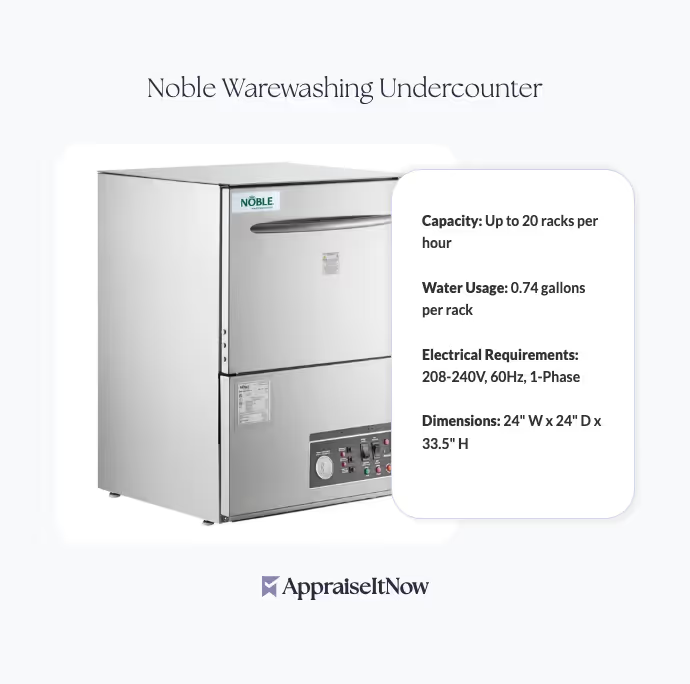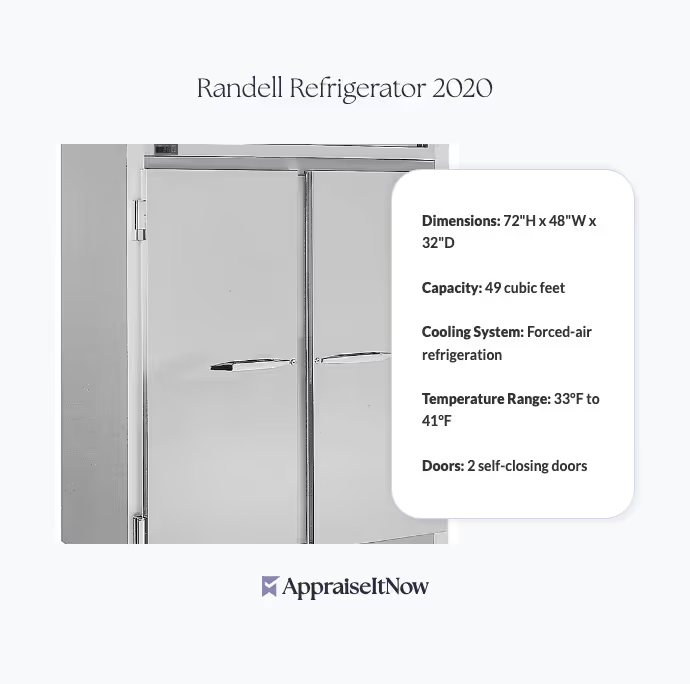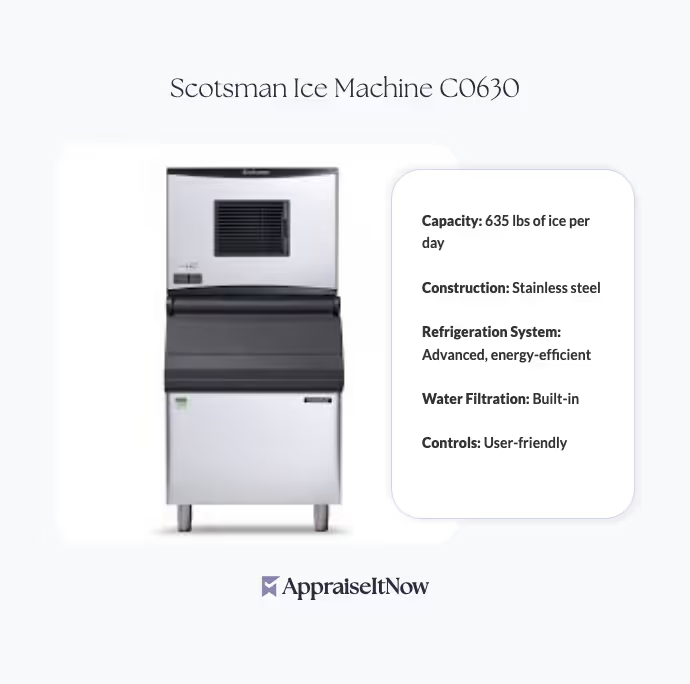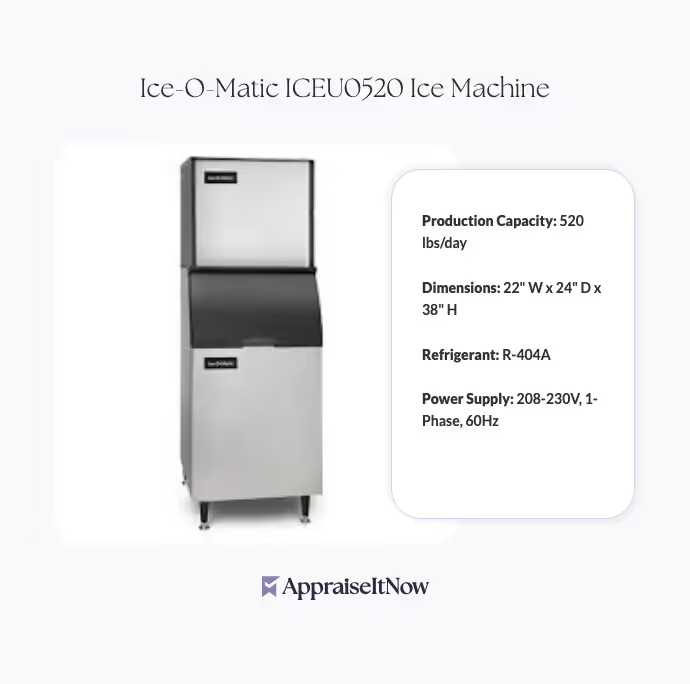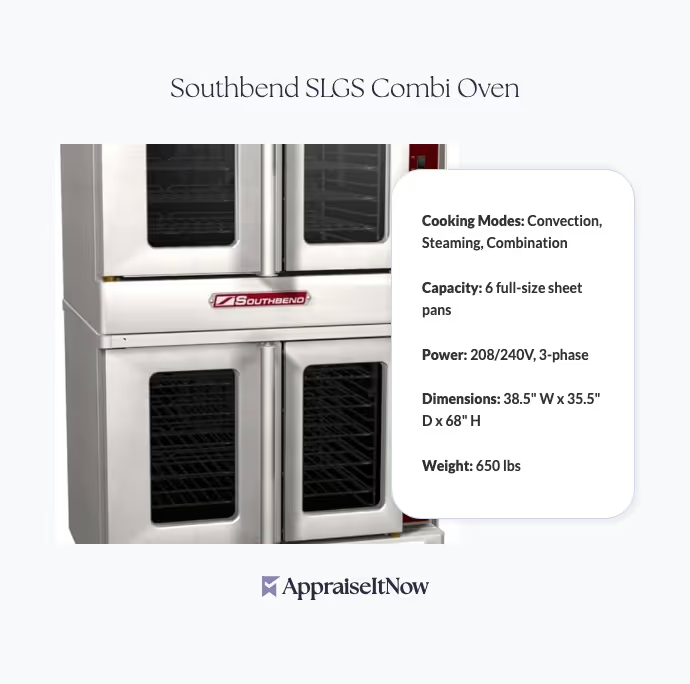<h1>How to Get Your Noble Warewashing Undercounter Appraised</h1>
<p>The Noble Warewashing Undercounter is a robust piece of commercial kitchen equipment designed to handle the demanding needs of busy restaurants, hotels, and foodservice operations. Whether you're evaluating a unit for purchase, sale, insurance, or tax documentation purposes, understanding what professional appraisers examine and how to prepare for the valuation process ensures you receive an accurate assessment of your equipment's true market value.</p>
<h2>Understanding Noble Warewashing Undercounter Market Value</h2>
<p>The <strong>$3,500 to $5,000 price range</strong> reflects the current market value for well-maintained Noble Warewashing Undercounter units in typical condition. This valuation encompasses the equipment's efficiency, durability, and operational reliability—factors that directly impact its worth in the commercial foodservice sector. When appraising any piece of <a href="/types/restaurant-equipment">restaurant equipment</a>, appraisers consider both the equipment's original cost and its depreciation based on age, usage, and condition.</p>
<p>The Noble Warewashing Undercounter earned its reputation within the industry for exceptional cleaning performance and cost-effective operation. Introduced in 2015, this model represents a significant technological advancement in compact dishwashing solutions, combining stainless steel construction with advanced water filtration systems that minimize operating expenses over the equipment's lifespan. Understanding this context helps explain why your unit maintains solid resale value even after years of service.</p>
<div class="callout tip"><p><strong>Valuation Insight</strong></p>
<p>Equipment manufactured by reputable brands with strong operational records typically maintains 40-60% of original purchase value, depending on age and condition. The Noble's market position places it favorably within this range.</p></div>
<h2>What Appraisers Examine During Valuation</h2>
<p>Professional appraisers evaluating your Noble Warewashing Undercounter assess multiple dimensions beyond its basic functionality. The appraisal process for <a href="/types/equipment-and-machinery">equipment and machinery</a> involves detailed inspection of structural integrity, mechanical performance, and market comparables to establish fair market value.</p>
<p>Your appraisal will likely include examination of the undercounter unit's stainless steel construction for corrosion, dents, or structural damage that impacts both aesthetics and functionality. Appraisers test the water filtration system's condition and replacement cost, as this advanced feature significantly contributes to the unit's value proposition and operational efficiency. The user-friendly controls receive evaluation for responsiveness and programming accuracy, while the mechanical components—pumps, motors, spray arms, and heating elements—are assessed for wear and remaining operational life.</p>
<p>Certification status matters considerably during valuation. Your Noble Warewashing Undercounter's <strong>NSF certification</strong> validates its compliance with food safety standards essential for commercial kitchen use, while its <strong>ENERGY STAR certification</strong> demonstrates superior efficiency that reduces utility costs. These certifications meaningfully enhance resale value because commercial operators seek equipment meeting these standards for both regulatory compliance and operational cost reduction.</p>
<h2>Age and Depreciation Factors</h2>
<p>Equipment depreciation follows predictable patterns in the commercial foodservice industry. A Noble Warewashing Undercounter maintains stronger value retention than older pre-2015 models due to its more advanced technology and efficiency improvements. However, specific age and usage history significantly influence individual unit valuations within the broader $3,500-$5,000 market range.</p>
<p>Most commercial warewashing equipment depreciates approximately 15-20% annually during the first five years of operation, then stabilizes at a slower depreciation rate as the equipment reaches mid-life. A well-maintained unit purchased ten years ago likely appraises below the current market range, while newer examples (3-5 years old) may command valuations at the higher end or exceed the typical range if they've been minimally used and meticulously maintained.</p>
<p>Documentation of service history proves invaluable during appraisal. Maintenance records demonstrating regular preventive servicing, filter replacements, and component refurbishment signal to appraisers that the equipment received proper care. Conversely, units with unknown maintenance histories or visible signs of deferred maintenance will appraise at the lower end of the market range or below.</p>
<h2>Condition Assessment and Its Impact on Value</h2>
<p>The physical and operational condition of your Noble Warewashing Undercounter directly determines where your specific unit falls within the $3,500-$5,000 range. Professional appraisers evaluate condition through systematic examination that considers both cosmetic presentation and mechanical functionality.</p>
<p>Cosmetic condition encompasses the stainless steel exterior's finish quality—units with minimal scratches, dents, or corrosion command premium valuations, while those showing heavy use marks or rust spots appraise lower. Interior condition proves equally important; the wash chamber's cleanliness and freedom from mineral deposits or residue buildup indicate whether the advanced water filtration system continues operating at peak efficiency. Controls and display panels should be clear and fully functional, as replacement costs for damaged control boards significantly impact overall value.</p>
<p>Mechanical performance evaluation focuses on the undercounter unit's core functionality. Does the equipment complete wash cycles efficiently? Do spray arms rotate freely and provide consistent water coverage? Does the heating element maintain proper water temperature for effective sanitization? These functional elements determine whether the unit operates at manufacturer specifications or requires repairs that reduce its market value. An appraisal will likely include operational testing to verify these critical systems.</p>
<div class="callout note"><p><strong>Condition Categories</strong></p>
<p>Excellent condition units (minimal cosmetic wear, fully operational) appraise near the $5,000 upper range, while fair condition units showing moderate wear or minor repairs needed typically appraise around $3,500-$4,000.</p></div>
<h2>How Appraisers Determine Fair Market Value</h2>
<p>Professional appraisers employ standardized methodologies to establish your Noble Warewashing Undercounter's fair market value. The approach mirrors how <a href="/types/beverage-equipment">beverage equipment</a> and other commercial foodservice items receive valuation, using comparable sales data, depreciation analysis, and condition assessment to reach conclusions.</p>
<p>The comparable sales approach involves researching recent transactions of similar Noble Warewashing Undercounter units or comparable competitive models to establish pricing benchmarks. Appraisers access industry databases, auction records, and dealer listings to identify what similar equipment actually sold for in the current market. Regional variations matter—units in areas with higher commercial real estate values and robust foodservice sectors may command modestly higher prices than those in markets with less demand for commercial equipment.</p>
<p>The cost approach to valuation considers the equipment's original purchase price, subtracts accumulated depreciation based on age and condition, then adjusts for current market conditions. This method ensures valuation reflects the investment's original cost while acknowledging typical equipment wear and technological advancement that reduces value over time.</p>
<p>Income approach valuation—less common for standalone equipment but relevant in some contexts—considers how the equipment's operational efficiency reduces a restaurant's utility and operational costs, then assigns value based on those cost savings over the unit's remaining service life.</p>
<h2>When to Seek Professional Appraisal Services</h2>
<p>You should obtain a professional appraisal of your Noble Warewashing Undercounter in several situations. If you're planning to <strong>sell the equipment</strong>, an independent appraisal provides documentation of fair market value that supports your asking price and gives potential buyers confidence in the valuation. When <strong>purchasing used equipment</strong>, an appraisal ensures you're paying appropriate market value and helps identify potential issues requiring repair cost adjustment.</p>
<p><strong>Insurance purposes</strong> represent another critical reason for professional appraisal. Documenting your commercial equipment's replacement value ensures adequate coverage for casualty losses. Insurance companies often require recent appraisals for items valued above certain thresholds, and having certified documentation prevents disputes if you need to file a claim. When planning <strong>tax deductions</strong> for business equipment donations or calculating <strong>depreciation schedules</strong> for accounting purposes, an appraisal provides the documentation that satisfies regulatory requirements and supports your tax filings with the IRS.</p>
<p><strong>Estate settlements and business valuations</strong> frequently require comprehensive equipment appraisals. If you're closing a restaurant, transferring a business, or settling an estate that includes commercial kitchen equipment, professional appraisals establish documented values for legal and financial purposes.</p>
<div class="callout tip"><p><strong>Documentation Value</strong></p>
<p>A certified appraisal from a qualified professional provides documentation accepted by financial institutions, tax authorities, and insurance companies—essential protection for your asset.</p></div>
<h2>Why Brand Reputation Matters in Equipment Valuation</h2>
<p>The Noble brand's strong reputation in commercial foodservice directly supports your equipment's market value. Restaurants and foodservice operators prioritize equipment from manufacturers known for durability, efficiency, and reliable customer support. The Noble Warewashing Undercounter's NSF and ENERGY STAR certifications, combined with its track record since 2015, establish it as equipment serious commercial operators actively seek.</p>
<p>This contrasts with <a href="/blog/the-basics-of-equipment-and-machinery-appraisal">equipment and machinery</a> from lesser-known manufacturers or brands with reliability concerns. When appraisers evaluate your equipment, they consider whether potential buyers perceive the brand as a sound investment. Equipment from respected manufacturers typically appraises 15-30% higher than functionally similar equipment from brands with weaker market positions, assuming comparable condition and age.</p>
<p>The Noble Warewashing Undercounter's compact undercounter design also enhances its value by maximizing space efficiency in modern restaurant kitchens where square footage costs significantly impact overall operations. This practical advantage creates consistent market demand, stabilizing values compared to equipment that's become obsolete or fallen out of favor.</p>
<h2>Preparing Your Equipment for Appraisal</h2>
<p>Before your appraisal appointment, take steps to present your Noble Warewashing Undercounter favorably while ensuring appraisers can thoroughly evaluate all components. Clean the exterior thoroughly, removing grease buildup and visible residue that might obscure the appraiser's view of the stainless steel condition. However, avoid aggressive cleaning or repairs immediately before appraisal—appraisers expect to see the equipment's actual operating condition, and fresh paint or repairs might suggest you're hiding underlying issues.</p>
<p>Gather documentation supporting your equipment's value. Original purchase receipts showing the unit's age help appraisers establish depreciation baselines. Service records demonstrating regular maintenance signal proper care and support higher valuations. Manuals, warranty information, and certification documentation reinforce the equipment's specifications and compliance status. If you've performed any significant repairs or component replacements, compile those records showing the work was completed professionally.</p>
<p>Ensure the equipment is accessible for thorough inspection. Appraisers need to examine the unit from multiple angles, test controls and operations, and potentially access areas underneath or behind the equipment. Clear space around the unit and ensure all controls function properly—non-responsive buttons or stuck dials might suggest mechanical issues affecting valuation.</p>
<h2>Understanding Common Valuation Questions</h2>
<p>Restaurant operators frequently ask about dishwasher options when replacing equipment, leading to questions about whether the Noble Warewashing Undercounter represents the best choice. While preferences vary based on specific operational needs, the Noble's position in the $3,500-$5,000 range reflects strong market confidence in its value proposition. The equipment's cost-effectiveness during operation—driven by its advanced water filtration system and ENERGY STAR efficiency—means operators often recover the equipment's cost through reduced utility and water expenses over the unit's service life.</p>
<p>Questions about dishwasher longevity are equally relevant for valuation. Most commercial warewashing equipment, including the Noble Warewashing Undercounter, maintains operational life of 10-15 years with proper maintenance, though specific component replacements may be needed as the equipment ages. Equipment at the mid-point of its expected lifespan (5-7 years old) appraises strongest because it retains several remaining years of productive service.</p>
<div class="callout note"><p><strong>Key Takeaway</strong></p>
<p>Professional appraisal of your Noble Warewashing Undercounter provides certified, documented valuation that supports buying decisions, insurance coverage, tax documentation, and sale transactions. By understanding the factors appraisers evaluate—age, condition, certifications, and market demand—you can maximize your equipment's value and make informed decisions about this important commercial kitchen asset.</p></div>
